Recent Papers by David Kenny
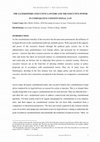
International Journal of Constitutional Law (ICON), 2022
The growth in the power of the executive branch of government has been accompanied by a related g... more The growth in the power of the executive branch of government has been accompanied by a related growth – heretofore unexplored in the literature on comparative constitutional law – of the role and importance of executive legal advisors. These influential but often secretive advisors can be the first and sometimes only group to review the actions of the executive, or legislative proposals before enactment, for compliance with the constitution. In this article, we compare this practice in four similar but somewhat distinct jurisdictions – the UK, Canada, the US and Ireland – to assess its impact on constitutionalism and the executive power. We conclude that the practice of constitutional review by executive lawyers is highly variable, changing between places and over time along four key axes that can either empower or constrain the executive to varying degrees. It can restrain excutive action by holding it within constitutional boundaries; it can bolster the executive power by giving legalistic credibility to its actions while providing little restraint in practice; or it can create policy distortion by overly tightly binding executive and legislative action. Constitutional advice from executive legal advisors, then, does not operate as an exogenous constraint on executive power, but can be structured and manipulated by the executive to have various different effects. As such, we argue that this institution requires much more attention from both comparative constitutional lawyers and constitutional designers to map its effects on the constitutional order and to see what structures, processes and cultural factors might shape it. Finally, we argue for increased transparency in the provision of executive constitutional advice, as without this, even understanding its effects is extremely difficult.
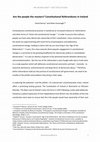
Richard Albert and Richard Stacey (eds), The Limits and Legitimacy of Referendums (OUP 2021) FORTHCOMING, 2021
According to some, we are now living in the ‘Age of the Referendum’. But the rise of the referend... more According to some, we are now living in the ‘Age of the Referendum’. But the rise of the referendum is fraught with worry it will usher in a crude populism which will obliterate constitutional constraints and lead – ironically - to executive dominance, authoritarianism and deep forms of democratic decay. Therefore, whilst referendums hold out the promise of constitutional self-government, we need to be mindful of the pitfalls and problems they bring in their wake.
In exploring the potential—and the pitfalls—of a democratic constitutionalist vision, Ireland offers a promising testing ground. On the surface, one might think that Ireland’s referendum process would fall victim to many of the common concerns about referendums. In initiation and formulation, the process is open to elite capture because the government gets to propose and formulate the referendum proposal which is put to the people. The process is purely majoritarian; 50% plus one of the voters on referendum day can approve any change. Any change can be proposed, however radical. Minority rights have been put to referendum vote. Ireland’s rules and regulation of campaign advertising and debate are loose and scant and seem unlikely to combat disinformation.
Yet, when examined closely, Ireland stands as a counterpoint to many of the criticisms and fears which surround referendums. Elite dominance, though formally prevalent, is offset by a substantial role for civil society in initiation and campaigning. Bare majority vote is supplemented by widespread participation and deliberation, which appears to be nuanced and robust, whilst minority rights have been vindicated when voted on. The process has not been subject to political exploitation for sweeping or abusive constitutional change. Though the record is far from perfect, referendums work reasonably well in Ireland, commanding high levels of popular participation and engagement, which go well beyond the mere act of ratifying or rejecting a referendum proposal at the ballot box and extend to widespread, relatively well-informed and committed popular deliberation. During a constitutional referendum in Ireland, a national conversation takes place about what people want their Constitution to mean. As such, Ireland is a crucial case-study in exploring the promise - and perils - of constitutional referendums.
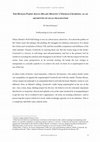
Law and Literature, 2021
Hilary Mantel's Wolf Hall trilogy are iconic pieces of literature, but also represent a hugely in... more Hilary Mantel's Wolf Hall trilogy are iconic pieces of literature, but also represent a hugely insightful commentary on the law. Her protagonist, Thomas Cromwell, is the archetype of a philosophical legal pragmatist: willing to use the law and its language to achieve his ends, but regarding adherence to any principled or abstract account of the law as misleading and even dangerous. With striking parallels to the pragmatist philosophy of William James, Richard Rorty, Richard Posner and others, Mantel's Cromwell illustrates both the promise of legal pragmatism — its ability to get results without false conjunction about means — but also its dangers — that one may pick the wrong prince, or make flawed or base calculations on how to act. The Wolf Hall trilogy shows this in a manner far more clear and far more vivid than any purely philosophical accounts, and capture something deep about the theory and practice of law. As such, their commentary on the law, authority and governance deserves our close attention.
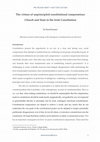
European Constitutional Law Review, 2020
Constitutions present the opportunity to set out, in a clear and lasting way, social compromises ... more Constitutions present the opportunity to set out, in a clear and lasting way, social compromises that attempt to mediate between conflicting social groups and political goals. It is my case in this paper that, when making constitution, we should be willing to be unprincipled: that the compromises made in constitutions should be made purely pragmatically, not guided by any set of general or generalisable theories or principles, but by local, contingent, functional considerations. Their merit lies in their practical ability to temper and defuse disagreement, rather than in any abstract or principled assessment of their quality or conceptual consistency. The best approaches in practice may be inconsistent and unprincipled.
Part I argues against principled accounts of constitutionalism. Far from this being a problem, unprincipled inconsistency is a strength in allowing flexibility and adaptability. Accommodating deep disagreement may require recognising divergent values, and obfuscating (and thus deferring decision about) how they will interact. Church-state arrangements are one good example of this.
Part II explores the inconsistencies of the Irish constitutional position on religion. Despite a common view that it is either bad or incoherent, I argue that that the Irish Constitution was in fact a good and successful pragmatic compromise to mediate between two deeply divided religious groups: an overwhelmingly Catholic and very pious population would not ratify any constitution that gave insufficient respect to religion and would obstruct the pursuit of Catholic values; and a population of Protestants, north and south of the Irish-UK border, that would threaten religious peace and cooperation in the new state and frustrate unification of the island if they felt the Constitution did not protect them to some degree from Catholic majoritarianism.
The paper concludes with a call to embrace unprincipled compromises in constitutions to mediate disagreement, and write, apply, judge and reform constitutions on this basis.
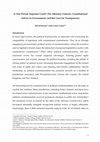
Dublin University Law Journal, 2019
The Irish Attorney General's Office seemingly plays a major role in Irish politics in advising th... more The Irish Attorney General's Office seemingly plays a major role in Irish politics in advising the government on the constitutionality of Bills and policies. With scant basis in the constitutional text, this advice appears to have become central to policymaking, with the executive regarding it as a near-binding determination of constitutional issues, and allowing policy to be halted by this advice. Yet the advice itself is almost never published, and is not open to public or political contestation or debate. In this paper, we attempt to map the role and influence of the Attorney General in Ireland based on the limited available information, and critically examine the office's independence, its apparent influence on policy, and the apparently belief of government that its advice is binding. We conclude that either the AG distorts policymaking, or that its advice is capable of misuse by government to justify its action or inaction, but that without full access to its advice we cannot tell which. We conclude by arguing that transparency in this process is essential so that we might know the true influence of the office, and so that parliamentarians and the people could engage in debate about this advice and contest it where appropriate.
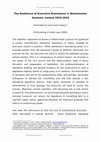
Public Law, 2021
The imperfect separation of powers in Westminster systems has produced a curious contradiction: l... more The imperfect separation of powers in Westminster systems has produced a curious contradiction: legislative supremacy in theory eclipsed by executive control in practice. This phenomenon can be termed executive dominance, and in extreme instances can reduce the legislature to something akin to a reactive rubber stamp, approving whatever the executive proposes with little to no autonomous power. This dominance sits uneasily with articulated constitutional principles which emphasize legislative predominance, but has largely been considered a matter of realpolitik, a function of executives having strong party discipline over a legislative majority. However, recent trends suggest that executive dominance may be a more resilient and entrenched phenomenon than was previously supposed. In several Westminster systems, the executive has retained remarkable control of the legislative process in spite of not having a legislative majority. Even minority governments have proven capable of stifling the legislature in the performance of its functions.
In this article, we use Ireland’s recent experience of minority government as a case study. Several longstanding elements of parliamentary and government process were used by the executive to create a form of legislative veto over private members legislation and leave it with substantial control over the legislative process. Essentially, executive dominance remained, in spite of minority government and other factors which might have been expected to reduce it. We argue this experience shows that executive dominance is resilient because it is a function of political and constitutional culture just as much as formal rules. This culture is a set of beliefs and assumptions about politics and its operation which undergirds and shapes our understanding of the rules and how constitutional actors ought to function. Executive dominance appears to be cultural, an assumption that underlies parliamentary democracy and its institutions and animates the practices and interpretations of rules that entrench this phenomenon. This serves an important lesson to anyone who would seek to reform parliamentary practices to empower the legislature or challenge executive dominance.
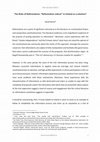
Maria Cahill, Seán Ó Conaill, Colm O'Cinneide, Conor O'Mahony (eds) Constitutional Change and Popular Sovereignty: Populism, Politics and the Law in Ireland, Routledge, Forthcoming, 2021
Referendums, in the aftermath of Brexit and with the rise of populist movements worldwide, are vi... more Referendums, in the aftermath of Brexit and with the rise of populist movements worldwide, are viewed with great skepticism, seen as a means for populist leaders and elites to manipulate or mislead voters rather than any positive exercise in democracy. Ireland tells a somewhat different story. In Ireland, referendums to change the constitution are, increasingly, regularly held and, surveys suggests, extremely popular. They also do not display many of the worst traits that critics fear. Experts are generally respected and their views are embraced. There have not been widespread problems of fake news and manipulation of the referendum process. Prominent roles have been given to civil society groups and, more recently, citizens’ assemblies in initiation of referendums and, in the former case, in campaigning. There is evidence of voters adopting very nuanced views of the issues they are voting on. There is evidence of people being wary of uncertain and unclear proposals, even if they favor the change in principle. These are remarkably positive features, by and large avoiding the major problems suggested by critics of referendums
This is probably in spite of, not because of, Ireland’s formal referendum regulation, which is skeletal at best. It is, I suggest, primarily a function of a “referendum culture” which has developed over time and from experience, and exists and a set of unspoken cultural assumptions that guide people, politicians and campaigners and seemingly produce positive results. In this paper, I seek to illustrate certain aspects of this culture that are apparent from recent referendum campaigns, and also to point out its limitations and drawbacks. The Irish experience may suggest that some of the core critique of referendums are contingent, not fundamental: that you can have a functional referendum process with the development of a culture of referendums. But it also suggests that it might be difficult to achieve, probably requires long experience and development of culture, and is always a precarious achievement. The efficacy of this culture in Ireland may be threatened by the rise of social media, where there is, as yet, no formal rules and no effective culture around it. In this, Ireland affirms one of the core critiques of referendums: that they are poor mechanisms for occasional or ad hoc use, and should only be deployed where there is time and opportunity for distinctive political cultures around referendums to develop. Even then, there is no guaranteed recipe for success.
Comparative Constitutional Law by David Kenny
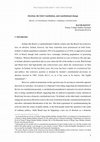
Revista de Investigações Constitucionais / Brazilian Journal of Constitutional Research, 2018
Abortion in Ireland is regulated by a constitutional provision that was inserted following a refe... more Abortion in Ireland is regulated by a constitutional provision that was inserted following a referendum in 1983. In May 2018, the Irish people, will voted to remove this provision from the Irish Constitution. In this paper, I examine the reasons for the insertion of the provision; the problems that emerged with it over time; the factors that motivated the campaign for change; and the gradual process of negotiating a proposed change within the political system. The paper concludes by drawing general lessons that might be derived about the about the costs and consequences of the Irish experience of making abortion into a matter of constitutional law and debating its removal. Though somewhat effective in blocking political opponents, constitutionalising abortion has had unexpected consequences: creating uncertainty; involving the judiciary in the regulation of abortion; and perhaps creating a tendency to elevate social and political issues to the constitutional level.
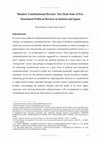
International Journal of Constitution Law (ICON) (forthcoming), 2019
Political constitutionalism is a major area of enquiry in contemporary constitutional discourse. ... more Political constitutionalism is a major area of enquiry in contemporary constitutional discourse. A significant and increasingly central aspect of political constitutionalism is pre-enactment political review: laws being reviewed for constitutionality or rights-compliance by parliament or the executive. This institution is said to be a good augmentation of, or even replacement for, the institution of judicial review, and is said to bring with it a host of normative benefits. In this article, we wish to highlight an under-explored dark side to pre-enactment review. By undertaking a comparative analysis of functional pre-enactment review in several similar jurisdictions – Canada, New Zealand and the UK – we contrast these systems, and the ordinary failings they display, with the much deeper problems of pre-enactment review in Ireland and Japan. These latter jurisdictions, we argue, not only fail to instantiate the benefits of pre-enactment review but in fact show that, in the right circumstances, pre-enactment review can have negative effects that are antithetical to the goals and values of political constitutionalism. We call this phenomenon ‘shadow constitutional review’, and suggest that it adds a layer of complexity and nuance to contemporary discussions of political constitutionalism.
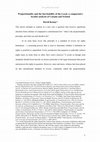
American Journal of Comparative Law (forthcoming)
The principle of proportionality is held out as a truly international tool of constitutional law ... more The principle of proportionality is held out as a truly international tool of constitutional law – a uniform process for assessing the legitimacy of restrictions of rights around the world. This article critiques that viewpoint, using what the author terms a comparative localist approach: looking at the detail how proportionality is used in two broadly similar jurisdictions – Canada and Ireland – that use a linguistically identical version of the principle. It examines differences in the application of the individual elements of the test in both places, and broader differences not related to any one individual part of the test. The analysis reveals that the countries apply the principle in drastically different ways. The article argues that despite the supposed constituency and uniformity that the proportionality test’s language and structure suggest, the application of the test is fundamentally and entirely contingent on local, contextual considerations and influences that will always change the way it applies. The test itself has very little fixed content. It suggests that both the international and domestic, local scholarship about proportionality underestimates the fundamentality of this problem, thinking variability not to compromise the integrity of the concept of proportionality. This is because international scholarship is too general to see the extent of these specific problems at the local level, while local scholarship attributes these problems to national misapplication rather than problems with the test in general. Only with a comparative localist analysis can these problems be laid bare. The article concludes by asking what we can make of proportionality in light of these observations, arguing that proportionality is no more than a rhetoric that stitches together divergent practices, and considering whether it should be retained in light of that reality.
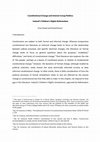
In 2012, a referendum was held to insert a new Article on children’s rights into the Irish Consti... more In 2012, a referendum was held to insert a new Article on children’s rights into the Irish Constitution. This amendment, according to its proponents, addressed problems that had emerged in Irish constitutional law where “parents rights” where held to be superior to “children’s rights”. In this chapter, we use the experience of this constitutional referendum to explore how processes of formal constitutional amendment can be used to alter intricate matters of constitutional law doctrine, and to illustrate the difficulties that such attempts encounter. We argue that the calls for this reform were based on a misunderstanding of this area of constitutional law, and that the changes wrought by the amendment were minimal. Despite this, interest groups that had called for the amendment insisted that it was a major change, leading to a confusing referendum campaign that failed to engage the public and resulted in the referendum passing by a surprisingly narrow margin. From this experience, several lessons can be drawn about the difficulties of amending constitutions to achieve changes in legal doctrine; about the role of legal academics in highlighting constitutional problems and correcting misunderstandings of constitutional issues; and about the underexplored role of interest groups in effecting constitutional change.
The study of conventions forces us to confront serious epistemological questions. One might quibb... more The study of conventions forces us to confront serious epistemological questions. One might quibble about the details, but it is generally agreed that conventions exist in the minds of those who feel bound by them, a confluence of collective practice and belief that the practice is normatively significant. We are therefore left with the problem of trying to figure out when, how, and why this feeling of obligation to follow a convention develops, or deteriorates. We do this as external observers, unsure of the mental operations of the relevant actors. We must rely on evidence of these mental operations as translated into action, or on the actors' own accounts of their conduct. This means that the actual existence of the conventions, and their ability to influence practice and conduct, might be different from what we know of them, and can know of them.
Irish Constitutional law by David Kenny
Paper presented to the first annual Irish Supreme Court Review, October 6th 2018.

Constitutional challenges have to be grounded in reality, focusing on actual or apprehended appli... more Constitutional challenges have to be grounded in reality, focusing on actual or apprehended application of laws rather than words alone. This is achieved by two sets of procedural rules in constitutional law: standing rules, deciding who can take constitutional challenges to laws and what arguments they can make; and remedial rules, deciding what the consequence of a finding of unconstitutionality will be. This article argues that though Irish courts have successfully focused constitutional challenges on the application of law with standing rules, they have not done so in respect of remedies, which are far too sweeping, and stretch far beyond the particular unconstitutional applications that create constitutional problems. It suggests that constitutional challenges in Ireland should be radically overhauled, replacing the primary constitutional remedy of outright invalidity of laws with the invalidity of applicationsas-applied constitutional challenges. These challenges, which are the core remedial tool of US constitutional law, are totally unknown to Irish law. The article suggests, however, that they are fully compatible with the text and structure of the Irish Constitution, and would bring about several positive changes in Irish constitutional law.
Constitution at 80 Conference
This paper, presented at the Constitution at 80 Conference at the University of Limerick in Novem... more This paper, presented at the Constitution at 80 Conference at the University of Limerick in November 2017, discusses recent remedial innovations in the cases of NHV, Persona, and PC, and its implications for Irish constitutional law. It also discusses the meaning of these developments for Ireland's constitutional culture, and explores the unusual position we find ourselves in as we reach the Constitution's 80th anniversary.
Co-authored with Gerard Hogan and Rachael Walsh. Pre-review draft - not for citation. Published i... more Co-authored with Gerard Hogan and Rachael Walsh. Pre-review draft - not for citation. Published in the 2015 Irish Jurist.

Uploads
Recent Papers by David Kenny
In exploring the potential—and the pitfalls—of a democratic constitutionalist vision, Ireland offers a promising testing ground. On the surface, one might think that Ireland’s referendum process would fall victim to many of the common concerns about referendums. In initiation and formulation, the process is open to elite capture because the government gets to propose and formulate the referendum proposal which is put to the people. The process is purely majoritarian; 50% plus one of the voters on referendum day can approve any change. Any change can be proposed, however radical. Minority rights have been put to referendum vote. Ireland’s rules and regulation of campaign advertising and debate are loose and scant and seem unlikely to combat disinformation.
Yet, when examined closely, Ireland stands as a counterpoint to many of the criticisms and fears which surround referendums. Elite dominance, though formally prevalent, is offset by a substantial role for civil society in initiation and campaigning. Bare majority vote is supplemented by widespread participation and deliberation, which appears to be nuanced and robust, whilst minority rights have been vindicated when voted on. The process has not been subject to political exploitation for sweeping or abusive constitutional change. Though the record is far from perfect, referendums work reasonably well in Ireland, commanding high levels of popular participation and engagement, which go well beyond the mere act of ratifying or rejecting a referendum proposal at the ballot box and extend to widespread, relatively well-informed and committed popular deliberation. During a constitutional referendum in Ireland, a national conversation takes place about what people want their Constitution to mean. As such, Ireland is a crucial case-study in exploring the promise - and perils - of constitutional referendums.
Part I argues against principled accounts of constitutionalism. Far from this being a problem, unprincipled inconsistency is a strength in allowing flexibility and adaptability. Accommodating deep disagreement may require recognising divergent values, and obfuscating (and thus deferring decision about) how they will interact. Church-state arrangements are one good example of this.
Part II explores the inconsistencies of the Irish constitutional position on religion. Despite a common view that it is either bad or incoherent, I argue that that the Irish Constitution was in fact a good and successful pragmatic compromise to mediate between two deeply divided religious groups: an overwhelmingly Catholic and very pious population would not ratify any constitution that gave insufficient respect to religion and would obstruct the pursuit of Catholic values; and a population of Protestants, north and south of the Irish-UK border, that would threaten religious peace and cooperation in the new state and frustrate unification of the island if they felt the Constitution did not protect them to some degree from Catholic majoritarianism.
The paper concludes with a call to embrace unprincipled compromises in constitutions to mediate disagreement, and write, apply, judge and reform constitutions on this basis.
In this article, we use Ireland’s recent experience of minority government as a case study. Several longstanding elements of parliamentary and government process were used by the executive to create a form of legislative veto over private members legislation and leave it with substantial control over the legislative process. Essentially, executive dominance remained, in spite of minority government and other factors which might have been expected to reduce it. We argue this experience shows that executive dominance is resilient because it is a function of political and constitutional culture just as much as formal rules. This culture is a set of beliefs and assumptions about politics and its operation which undergirds and shapes our understanding of the rules and how constitutional actors ought to function. Executive dominance appears to be cultural, an assumption that underlies parliamentary democracy and its institutions and animates the practices and interpretations of rules that entrench this phenomenon. This serves an important lesson to anyone who would seek to reform parliamentary practices to empower the legislature or challenge executive dominance.
This is probably in spite of, not because of, Ireland’s formal referendum regulation, which is skeletal at best. It is, I suggest, primarily a function of a “referendum culture” which has developed over time and from experience, and exists and a set of unspoken cultural assumptions that guide people, politicians and campaigners and seemingly produce positive results. In this paper, I seek to illustrate certain aspects of this culture that are apparent from recent referendum campaigns, and also to point out its limitations and drawbacks. The Irish experience may suggest that some of the core critique of referendums are contingent, not fundamental: that you can have a functional referendum process with the development of a culture of referendums. But it also suggests that it might be difficult to achieve, probably requires long experience and development of culture, and is always a precarious achievement. The efficacy of this culture in Ireland may be threatened by the rise of social media, where there is, as yet, no formal rules and no effective culture around it. In this, Ireland affirms one of the core critiques of referendums: that they are poor mechanisms for occasional or ad hoc use, and should only be deployed where there is time and opportunity for distinctive political cultures around referendums to develop. Even then, there is no guaranteed recipe for success.
Comparative Constitutional Law by David Kenny
Irish Constitutional law by David Kenny
In exploring the potential—and the pitfalls—of a democratic constitutionalist vision, Ireland offers a promising testing ground. On the surface, one might think that Ireland’s referendum process would fall victim to many of the common concerns about referendums. In initiation and formulation, the process is open to elite capture because the government gets to propose and formulate the referendum proposal which is put to the people. The process is purely majoritarian; 50% plus one of the voters on referendum day can approve any change. Any change can be proposed, however radical. Minority rights have been put to referendum vote. Ireland’s rules and regulation of campaign advertising and debate are loose and scant and seem unlikely to combat disinformation.
Yet, when examined closely, Ireland stands as a counterpoint to many of the criticisms and fears which surround referendums. Elite dominance, though formally prevalent, is offset by a substantial role for civil society in initiation and campaigning. Bare majority vote is supplemented by widespread participation and deliberation, which appears to be nuanced and robust, whilst minority rights have been vindicated when voted on. The process has not been subject to political exploitation for sweeping or abusive constitutional change. Though the record is far from perfect, referendums work reasonably well in Ireland, commanding high levels of popular participation and engagement, which go well beyond the mere act of ratifying or rejecting a referendum proposal at the ballot box and extend to widespread, relatively well-informed and committed popular deliberation. During a constitutional referendum in Ireland, a national conversation takes place about what people want their Constitution to mean. As such, Ireland is a crucial case-study in exploring the promise - and perils - of constitutional referendums.
Part I argues against principled accounts of constitutionalism. Far from this being a problem, unprincipled inconsistency is a strength in allowing flexibility and adaptability. Accommodating deep disagreement may require recognising divergent values, and obfuscating (and thus deferring decision about) how they will interact. Church-state arrangements are one good example of this.
Part II explores the inconsistencies of the Irish constitutional position on religion. Despite a common view that it is either bad or incoherent, I argue that that the Irish Constitution was in fact a good and successful pragmatic compromise to mediate between two deeply divided religious groups: an overwhelmingly Catholic and very pious population would not ratify any constitution that gave insufficient respect to religion and would obstruct the pursuit of Catholic values; and a population of Protestants, north and south of the Irish-UK border, that would threaten religious peace and cooperation in the new state and frustrate unification of the island if they felt the Constitution did not protect them to some degree from Catholic majoritarianism.
The paper concludes with a call to embrace unprincipled compromises in constitutions to mediate disagreement, and write, apply, judge and reform constitutions on this basis.
In this article, we use Ireland’s recent experience of minority government as a case study. Several longstanding elements of parliamentary and government process were used by the executive to create a form of legislative veto over private members legislation and leave it with substantial control over the legislative process. Essentially, executive dominance remained, in spite of minority government and other factors which might have been expected to reduce it. We argue this experience shows that executive dominance is resilient because it is a function of political and constitutional culture just as much as formal rules. This culture is a set of beliefs and assumptions about politics and its operation which undergirds and shapes our understanding of the rules and how constitutional actors ought to function. Executive dominance appears to be cultural, an assumption that underlies parliamentary democracy and its institutions and animates the practices and interpretations of rules that entrench this phenomenon. This serves an important lesson to anyone who would seek to reform parliamentary practices to empower the legislature or challenge executive dominance.
This is probably in spite of, not because of, Ireland’s formal referendum regulation, which is skeletal at best. It is, I suggest, primarily a function of a “referendum culture” which has developed over time and from experience, and exists and a set of unspoken cultural assumptions that guide people, politicians and campaigners and seemingly produce positive results. In this paper, I seek to illustrate certain aspects of this culture that are apparent from recent referendum campaigns, and also to point out its limitations and drawbacks. The Irish experience may suggest that some of the core critique of referendums are contingent, not fundamental: that you can have a functional referendum process with the development of a culture of referendums. But it also suggests that it might be difficult to achieve, probably requires long experience and development of culture, and is always a precarious achievement. The efficacy of this culture in Ireland may be threatened by the rise of social media, where there is, as yet, no formal rules and no effective culture around it. In this, Ireland affirms one of the core critiques of referendums: that they are poor mechanisms for occasional or ad hoc use, and should only be deployed where there is time and opportunity for distinctive political cultures around referendums to develop. Even then, there is no guaranteed recipe for success.
Irish unification must therefore involve, if it is to meet the three criteria identified above, concurrent referendums North and South followed by legislation approved by Westminster and the Oireachtas (Irish Parliament). We go further, however, and specify three desiderata against which unification processes can be assessed. First, that those voting in referendums should be able to have a reasonably clear idea of what the implications of their vote. Second, that the processes should reduce the risk of the UK and Ireland diverging over the final constitutional status of Northern Ireland. Third, that the processes should allow for a wide range of consultation and negotiation over the constitutional and political structure of a unified Ireland, including extensive attempts to engage with the views of northern unionists. We identify several models that fit the legal parameters. We suggest, however, that the model that best meets the desiderata is one in which the form of a united Ireland is settled through negotiations prior to the referendums. The required legislation in Westminster and the Oireachtas should then follow as a matter of course.
http://www.drb.ie/essays/in-two-minds
The introduction of domestic water charges with the aim of reducing water waste and improving water infrastructure resulted in massive backlash, far greater than those from more severe consequences of austerity such as tax hikes, sweeping cuts in expenditure, a colossal bank bailout, and very high unemployment. It spawned a populist political movement, rallying and uniting left-wing political parties and creating a major lobby and protest group. Massive demonstrations were held. Workers installing water meters were obstructed and harassed. A senior government official was trapped in her car by water protesters, leading to prosecutions of a number of water protesters for false imprisonment along with considerable public controversy around accusations of political policing. Many Irish people refused to pay water bills sent to them.
This has been the major issue championed by anti-austerity and left-wing populist parties, with calls for wide-scale boycotts and protests and even suggestions that a right to water should be inserted into the Irish Constitution. It has been the focal point of Irish politics for the last half decade, affecting the outcome of both local and general elections.
This is a strange story of populism. On the one hand, many of the risks often associated with populism – government capitulation to populist demands, creep of mainstream parties towards populist causes, a splintering of the parliament – actualised in Ireland. On the other hand, they actualised in an unusual way that has left the political establishment largely intact: the party that led the imposition of austerity remains in power; political and structural reforms have been minor; concessions to populism have been largely limited to the issue of water. It seems as though populism was contained.
I have two goals in this paper. First, I wish to map the idiosyncratic Irish experience, so that it can be considered in discussions of populism; and secondly, I wish to use this example to make a broader point about the local nature of populism.
Certainly, Ireland’s experience of populism can only be properly understood in light of its public law and conventions: its electoral system, executive dominated government, centrist political culture, and particular economic circumstances all played a role. From this, it might be thought that generalisable lessons could be learned from the Irish experience about avoiding the worst effects of populism, but I wish to argue that the opposite is true: Ireland’s unique experience shows the irreducible complexity and locality of populism. Populism is always contingent and local, reacting the peculiarities of political culture and circumstance. The best way to study populism is not through theory and search for similarity, but through observation of diversity. While we might see some similarity, pattern, and convergence in populism around the world, this is largely happenstance, and populism will always be recast and remade in each and each place to produce distinct and often unpredictable results. It is, even if while it seems to sweep the world, fundamentally a local phenomenon. The surprising and peculiar characteristics of the Irish case help illustrate the local nature of populism, which should inform any analysis of contemporary populist movements.
If the Irish Constitution could fill this role, it would have to be overhauled in a major way, leaving a document that might look almost unrecognisable. The practicality of this should be carefully considered, but so too should the risk that unwritten or conventional aspects of the original constitutional order might remain in spite of radical change. This raises the philosophical quandary of the ship of Theseus: is a ship, with all its planks gradually replaced, still the same ship? The paper considers whether the protean nature of this radically amended constitution’s identity – simultaneously the same and vastly different – could offer a road to a successful compromise.